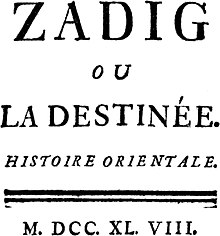Zadig
 |
|
| Author | Voltaire |
|---|---|
| Original title | Zadig ou la Destinée |
| Country | France |
| Language | French |
| Genre | Philosophical novel |
| Published | 1747 |
| Media type | |
Zadig ou la Destinée (Zadig, or The Book of Fate; 1747) is a novel and work of philosophical fiction by the Enlightenment writer Voltaire. It tells the story of Zadig, a philosopher in ancient Babylonia. The author does not attempt any historical accuracy, and some of the problems Zadig faces are thinly disguised references to social and political problems of Voltaire's own day.
It was originally published as Memnon in Amsterdam (with a false imprint of London given) and first issued under its more familiar title in 1748.
The book makes use of the Persian tale The Three Princes of Serendip. It is philosophical in nature, and presents human life as in the hands of a destiny beyond human control. Voltaire challenges religious and metaphysical orthodoxy with his presentation of the moral revolution taking place in Zadig himself. Zadig is one of Voltaire's most celebrated works after Candide. Many literary critics have praised Voltaire's use of contradiction and juxtaposition.
Zadig, a good-hearted, handsome young man from Babylonia, is in love with Sémire and they are to marry. Sémire, however, has another suitor: Orcan wants her for himself. Zadig tries to defend his love from Orcan's threat, but his eye is injured in the process. Sémire abhors this injury, causing her to depart with his enemy. Shortly after, Zadig makes a full recovery and falls into the arms of another woman, Azora, with whom he is married, but who promptly betrays him.
Disillusioned with women, Zadig turns to science but his knowledge lands him in prison, the first of several injustices to befall him. Indeed, the derives its pace and rhythm from the protagonist's ever-changing fortunes which see him rise to great heights and fall to great lows. Upon his release from prison, Zadig rises in favour with the king and queen of Babylonia and is eventually appointed prime minister; in this role he proves himself to be a very honest man, looked upon favourably by the king, as he passes fair judgements on his citizens unlike the other ministers who base their judgements on the people's wealth. He is forced to flee the kingdom, though, when his relationship with king Moabdar is compromised: Zadig's reciprocated love for queen Astarté is discovered and he worries that the king's desire for revenge might drive him to kill the queen.
...
Wikipedia
